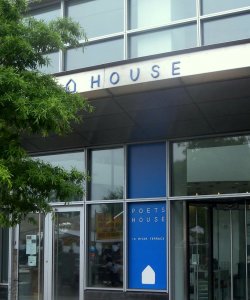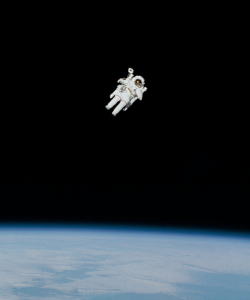GalleyCrush: Tethered to Stars

Fady Joudah’s Tethered to Stars, forthcoming from Milkweed Editions on March 9, 2021.
Jump to navigation Skip to content

Fady Joudah’s Tethered to Stars, forthcoming from Milkweed Editions on March 9, 2021.
“It would be silly to waste time daydreaming about, if only I were twenty years old again. It’s more interesting to figure out, how do I see the world now.” In this 2015 PBS NewsHour video, the late W. S. Merwin reflects on growing old and writing poems on the three acres of land he purchased in the late 1970s, now known as the Merwin Conservancy, an arts and ecology organization located on the island of Maui.

Poets House, a beloved New York City public poetry library, announced yesterday that it will suspend operations, effective immediately, due to financial issues brought on by the COVID-19 pandemic.
“Cats suffer from dementia too. Did you know that?” begins Margaret Atwood’s poem “Ghost Cat” from Dearly (Ecco Press, 2020), her first collection of poetry in over a decade. The poem centers on a cat with dementia who wanders the house at night nibbling on bits of food: “from a tomato here, a ripe peach there, / a crumpet, a softening pear. / Is this what I’m supposed to eat?” Cats have been at the center of literature for centuries, ranging from Christopher Smart’s eighteenth-century poem “Jubilate Agno,” which begins “For I will consider my Cat Jeoffry,” to Mikhail Bulgakov’s novel The Master and Margarita and Haruki Murakami’s novel Kafka on the Shore. Write a poem inspired by a cat. As an added challenge, try writing from the perspective of a cat, instead of from a human watching one.
“My poetry, never a quiet moment. You are mine, and you are content with the idea of having nowhere to go.” In this video, Marlon Lizama reads “Poetry” for the Write About Now Poetry series in Houston.

The author of When I Grow Up I Want to Be a List of Further Possibilities embraces and develops a queer Asian American poetics.
Dreaming of a post-pandemic future? Consider submitting to one of the following contests, which include opportunities to travel—public health conditions permitting—to Ireland and Texas. All close on November 30 and offer a cash prize of $1,000 or more.
Beloit Poetry Journal Chad Walsh Chapbook Series: A prize of $2,500, publication by Beloit Poetry Journal, and 50 author copies is given annually for a poetry chapbook. The editors will judge. Entry fee: $20.
BOA Editions A. Poulin Jr. Poetry Prize: A prize of $1,000 and publication by BOA Editions is given annually for a first book of poetry by a U.S. resident. Aimee Nezhukumatathil will judge. Entry fee: $25.
Fish Publishing Fish Short Story Prize: A prize of €3,000 (approximately $3,939) and publication in the annual Fish Publishing anthology is given annually for a short story. The winner will also be invited to attend a five-day short story workshop and read at the West Cork Literary Festival in West Cork, Ireland, in July 2021. Emily Ruskovich will judge. All entries are considered for publication. Entry fee: €20 (approximately $26) for online submissions or €22 (approximately $29) for submissions by mail.
LitMag Anton Chekov Award for Flash Fiction: A prize of $1,250 and publication in LitMag will be given annually for a piece of flash fiction. The winner will also have their work reviewed by agents from the Bent Agency, Brandt & Hochman, Folio Literary Management, InkWell Management, Sobel Weber Associates, and Triangle House Literary. The editors will judge. All entries are considered for publication. Entry fee: $16.
Munster Literature Center Gregory O’Donoghue International Poetry Prize: A prize of €2,000 (approximately $2,378), publication in Southword, and a weeklong residency at the Tyrone Guthrie Centre in Annaghmakerrig, Ireland, is given annually for a single poem. Peter Sirr will judge. Entry fee: €7 (approximately $8) for one poem or €30 (approximately $35) for five poems.
Narrative Fall Story Contest: A prize of $2,500 and publication in Narrative is given annually for a short story, a short short story, an essay, or an excerpt from a longer work of prose. A second-place prize of $1,000 and publication in Narrative is also awarded. The editors will judge. All entries are considered for publication. Entry fee: $27.
Quarter After Eight Robert J. DeMott Short Prose Contest: A prize of $1,008.15 and publication in Quarter After Eight is given annually for a prose poem, a short short story, or a micro-essay. Dinty W. Moore will judge. All entries are considered for publication. Entry fee: $15.
University of North Texas Rilke Prize: A prize of $10,000 is given annually for a poetry collection published in the previous year by a mid-career poet. Public health conditions permitting, the winner will also receive airfare and lodging to give a reading at the University of North Texas in April 2021. U.S. poets who have previously published at least two poetry collections are eligible. The poetry faculty of the University of North Texas will judge. Entry fee: none.
White Pine Press Poetry Prize: A prize of $1,000 and publication by White Pine Press is given annually for a poetry collection by a U.S. citizen. Entry fee: $20.
Visit the contest websites for complete guidelines, and check out the Grants & Awards database and Submission Calendar for more contests in poetry, fiction, and creative nonfiction.
“for the lingering / eyes of the children, staring...” In this video, the late poet Lucille Clifton reads “report from the angel of eden” and “sorrow song” at the 2008 Geraldine R. Dodge Poetry Festival.
During National Poetry Month last April, Words Without Borders asked its contributors to read their favorite poems from their archive. In this video, Valzhyna Mort reads her poem “Belarusian 1,” translated from the Belarusian by Franz Wright. Mort talks about her new poetry collection, Music for the Dead and Resurrected (Farrar, Straus and Giroux, 2020), in a recent installment of Ten Questions.
“So how do you discern a shape for / What is often called g-d.” Kazim Ali reads from his latest collection, The Voice of Sheila Chandra (Alice James Books, 2020), in this Academy of American Poets virtual reading and conversation with Joshua Bennett, author of Owed (Penguin Poets, 2020). For more from these poets, read what motivates Ali’s writing in Writers Recommend and about Bennett’s writing process in Ten Questions.